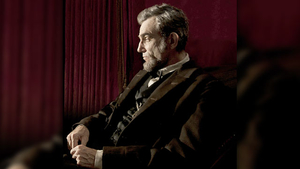Abraham Lincoln’s marble statue shuffles down from his monument in Washington D.C. dons a stove pipe hat and is deified on the screen in Steven Spielberg’s reverential historical drama Lincoln. The movie, now playing, covers the last three and a half months of the 16th U.S. president’s life.
Based on Doris Kearns Goodwin’s Pulitzer Prize Winning book, Team of Rivals, the film is adrenalin for political junkies who can relate and thrill to the backroom machinations employed as Lincoln attempts to get a 13th amendment to the constitution through the House of Representatives. As portrayed with a high pitched voice by Daniel Day Lewis, this is an embattled Lincoln, world weary, war weary, wily, but still stubborn and politically expedient. It is the Lincoln who said of himself, “My mind is like a piece of steel, very hard to scratch anything on it, and almost impossible after you get it there to rub it out.”
He tussles with his cabinet, he is harangued by his wife, and he grieves for the loss of his son. In spite of all the pain, he is not controlled by events but shapes them, not always cognizant of the consequences of what he intends to do. Tony (Angels in America) Kushner’s ferociously intelligent script gives us a Lincoln of searching mind and cool judgment who disarms opponents with brooding vigour as he delivers homespun parables, peppered with quotes from Euclid and Shakespeare and The Bible.
 Lewis does his best to demystify the man and make him human. The portrayal is melancholy and vulnerable and stubborn. The film is so authentic that the sound of the clock that you hear ticking is actually a pocket watch that belonged to Lincoln. But Day Lewis is caught with a soft-focus halo around his head at every turn, and lugubrious music swells like a hymn each time he appears. Surely its time to put Spielberg’s resident composer, John Williams out to pasture.
Lewis does his best to demystify the man and make him human. The portrayal is melancholy and vulnerable and stubborn. The film is so authentic that the sound of the clock that you hear ticking is actually a pocket watch that belonged to Lincoln. But Day Lewis is caught with a soft-focus halo around his head at every turn, and lugubrious music swells like a hymn each time he appears. Surely its time to put Spielberg’s resident composer, John Williams out to pasture.
No, in case you were wondering, Day Lewis doesn’t get to deliver the Gettysburg address. When we first see him on the screen, the canonization of Lincoln begins as young soldiers recite it to him as they would the Lord’s Prayer. As good as Daniel Day Lewis is, he isn’t the only one worth watching; equally powerful is Tommy Lee Jones, as a scene stealing fellow Republican Thaddesus Stevens, chairman of the powerful House Ways and Means Committee who shared his life with a woman who was part Black; James Spader, as William Bilbo, the foul mouthed enforcer, and Sally Field as the temperamental Mary Todd Lincoln.
Word of advice: If you are not up to speed on the period, you could get lost in the backstory. Why was the emancipation proclamation insufficient ? Why did the constitution need amending? Just who was that guy in a grey uniform on a horse at Appomattox and why did the union soldiers doff their hats to him as he rode away? We learn of the Lincoln’s assassination as his youngest son Tad, did - in another theatre watching Alladin the same night his father was shot at Ford’s Theatre.
The movie, either deliberately or otherwise, resonates with what is going on tooday in the United States Lincoln’s words cast a long shadow under the present circumstances: “We can only succeed by concert. The dogmas of the past are inadequate to the stormy present. We must think anew and act anew….”
Lincoln was great; the film, not quite as great as it might have been.

























Comments
Please login to post comments.